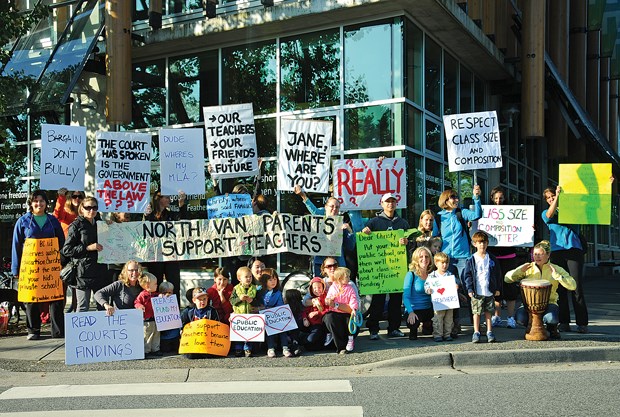Hopes were low Thursday that a quick settlement to the teachers' strike is in the offing after both sides in the dispute held news conferences this week blaming the other for refusing to budge on crucial issues.
North Vancouver social studies teacher Norm Nichols said the duelling press events didn't give him a lot of optimism.
"I don't see the schools are going to be open until October," he said. "Hopefully I'm wrong this time."
Addressing the teachers strike directly for the first time since schools failed to open Sept. 2, Premier Christy Clark said Wednesday there are "no easy fixes and no short cuts," to resolving the dispute. "There's no magic wand," she said.
Clark called on the teachers' union to suspend the strike and "come to the table with a proposal that's realistic," saying the union needs to get into the "affordability zone" similar to deals negotiated with other public sector unions.
She said she wants to see salaries negotiated before the two sides talk about classroom size and composition.
A short time later, B.C. Teachers Federation President Jim Iker blamed the government for the impasse, saying their negotiators had refused to meet over the summer. Iker rejected calls to suspend a strike, saying both sides need to compromise to get a deal.
"It's not about our members continually giving while government takes," said Iker.
Iker pointed out the province has the money to put a new roof on BC Place stadium but still maintains there is no cash for education. "It's about choices," he said. "It's about making education a priority."
But the news conferences are unlikely to help reach a deal, said Nichols. "They paint themselves into situations they can't get out of," he said.
Doni Gratton, a West Vancouver elementary school teacher librarian, said she's seen firsthand the impact of more kids with special needs in the classroom while supports for teachers have been shrinking.
Teachers are dealing with far more students with special needs - ranging from autism to learning disabilities to mental health problems - and students for whom English is a second language, she said - and "you're lucky if you have an (educational assistant) helping you."
North Vancouver parent Jacquie Stebbings has also had personal experience with the lack of support available in the classroom. She pulled her own 10-year-old son out of public school and enrolled him at Kenneth Gordon, a private school specializing in learning disabilities, when she realized he would not get the help he needed in the public system.
Stebbings said without support, it was too difficult for both her son and the teacher to have him continue in a regular classroom.
Stebbings, who has two other children in the public system, said she's seen some teachers who were "miracle workers" and others who were "just drowning" in the number of issues they were expected to manage in the classroom. "I can only imagine how difficult it must be," she said, acknowledging many families can't afford the $21,000-a-year she pays for private school. "Many kids, I think, slip through."
Meanwhile, North Vancouver student Cooper Rowe, 17, has been worrying this week what a delayed start of the school year might mean to her.
Rowe, who is going into Grade 12 at Handsworth, said she's hoping to apply to dramatic arts programs and will need good first-term marks by November to get accepted.
Some of her friends whose families can afford it have been looking into the option of private school, she said. But most students just have to wait. "This is a severely important year," she said. "For it to just not start ... I don't find it very acceptable."



